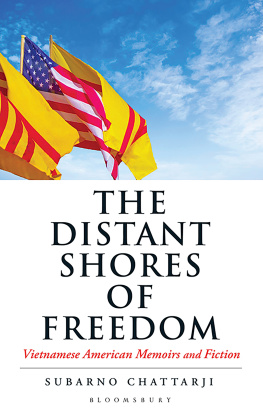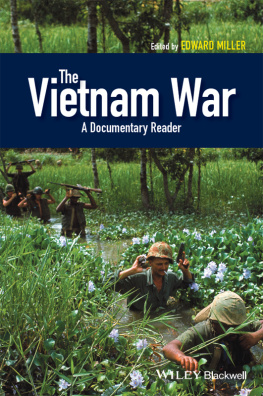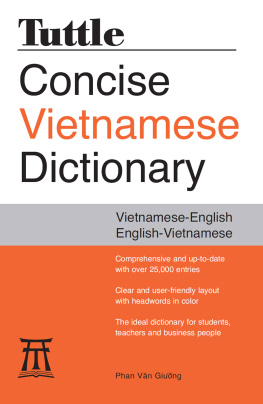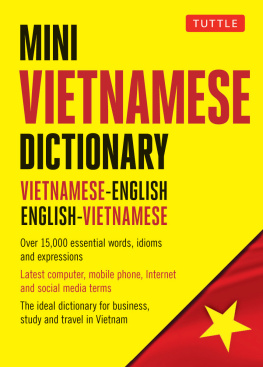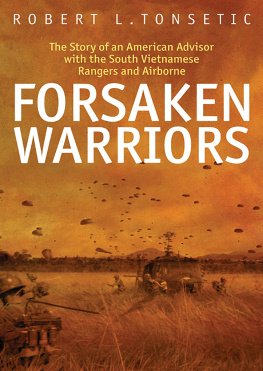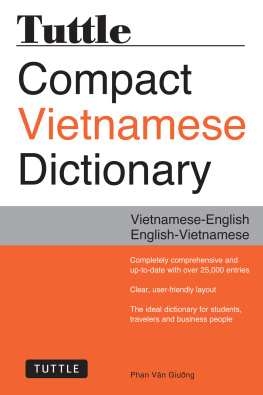Table of Contents

THE DISTANT
SHORES
OF
FREEDOM
THE DISTANT
SHORES
OF
FREEDOM
Vietnamese American Memoirs and Fiction
SUBARNO CHATTARJI

BLOOMSBURY INDIA
Bloomsbury Publishing India Pvt. Ltd
Second Floor, LSC Building No. 4, DDA Complex, Pocket C 6 & 7,
Vasant Kunj New Delhi 110070
BLOOMSBURY, BLOOMSBURY ACADEMIC INDIA and the Diana logo are trademarks
of
Bloomsbury Publishing Plc
First published in India 2020
This edition published 2020
Copyright Subarno Chattarji, 2020
Subarno Chattarji has asserted his right under the Indian Copyright Act to be identified as
Author of this work
Bloomsbury Academic
An imprint of Bloomsbury Publishing Plc
All rights reserved. No part of this publication may be reproduced or transmitted in any form or by any means, electronic or mechanical, including photocopying, recording, or any information storage or retrieval system, without prior permission in writing from the publishers
Bloomsbury Publishing Plc does not have any control over, or responsibility for, any third-party websites referred to or in this book. All internet addresses given in this book were correct at the time of going to press. The author and publisher regret any inconvenience caused if addresses have changed or sites have ceased to exist, but can accept no responsibility for any such changes
ISBN: HB: 978-93-88271-46-2; eBook: 978-93-88271-48-6
2 4 6 8 10 9 7 5 3 1
Created by Manipal Digital Systems
Printed and bound in India by [insert printer name and address]
Bloomsbury Publishing Plc makes every effort to ensure that the papers used in the manufacture of our books are natural, recyclable products made from wood grown in well-managed forests. Our manufacturing processes conform to the environmental regulations of the country of origin.
To find out more about our authors and books visit www.bloomsbury.com and sign up for our newsletters
Through careful research and with deep insights, Professor Subarno Chattarji has written a superb and balanced book on the themes that animate the works in English of Vietnamese American writers. He deftly identifies and elaborates on the key issues that preoccupy these memoirists and fiction writers: war and its aftermaths, memories of war, displacement as refugees and loss of homeland, identity in exile, adaptation to a new society, the push and pull of assimilation into American culture, loneliness, the comfort of community and its confines and constraints, victimhood, representation of the war and the sufferings it inflicted on themselves, their families and the people back in the homeland, and the fraught return to the ancestral land as the embers of war die away. I highly recommend this book not only to Vietnamese everywhere but also to those non-Vietnamese readers who are interested in how literature can capture the experiences and challenges of not only Vietnamese Americans but also of refugees in general.
Duong Van Mai Elliott, author of RAND in Southeast Asia: A History of the Vietnam War Era and The Sacred Willow: Four Generations in the Life of a Vietnamese Family, which was nominated for a Pulitzer Prize and featured in The Vietnam War PBS documentary by Ken Burns and Lynn Novick
While the Vietnam War was going on, the complex voices of its winners and losers were always being simplified for us by American journalists and politicians. It was a rare thing to hear actual testimonymuch less, analysisfrom those who were directly affected by the war, including Vietnamese Americans. Now, decades later, in Subarno Chattarjis Distant Shores of Freedom, we have an attentive study of the varied and often contrary voices of Vietnamese writers, as they regard the war and what it meant for them and their culture.
John Balaban, author of Remembering Heavens Face and Spring Essence: The Poetry of H Xun Hng
As he did with Memories of a Lost War: American Poetic Responses to the Vietnam War, Subarno Chattarji once again brings to bear in The Distant Shores of Freedom: Vietnamese American Memoirs and Fiction a formidable intellect and sharp analytical skills, this time shedding light on one of the most overlooked, ignored and neglected consequences of the American War in Vietnam: the plight of thousands of Vietnamese who chose to leave Vietnam and make new lives for themselves in the United States.
W.D. Ehrhart, author of Vietnam-Perkasie: A Combat Marine Memoir and Thank You for Your Service: Collected Poems, and editor of Carrying the Darkness: The Poetry of the Vietnam War
In this penetrating work, Chattarji looks at how the myriad consequences of the war in Vietnam have been represented and recorded in the writings of Vietnamese Americans. Through his astute analysis of these marginalised and often overlooked voices, Chattarji examines the post-war period from a fresh perspective and illuminates the complex intersections and articulations of departure and arrival, exile and home, self and community, alienation and belonging, and, ultimately, remembering and forgetting. This is an important and insightful contribution to our understanding of the aftermath and memory of the war in Vietnam.
Adam Gilbert is an American historian and currently an Affiliated Researcher at the Swedish Institute for North American Studies, Uppsala University. He is the author of A Shadow on Our Hearts: Soldier-Poetry, Morality, and the American War in Vietnam
For Jon Stallworthy
Contents
This book has been long in the making and I owe debts of gratitude to a host of people and institutions.
I am grateful to John S. Baky, former Director of Libraries at La Salle University (and currently Dean of Libraries, Emeritus, at La Salle), for access to the Imaginative Representations of the Vietnam War archive at La Salle. As a Fulbright Senior Research Fellow, I spent eight months at the collection and John and his staff at the Connelly Library went out of their way to help me with my research (even years after Id left La Salle).
The award of a Kluge Postdoctoral Fellowship at the John W. Kluge Center, Library of Congress, enabled me to continue with my research on the project. I am especially grateful to Carolyn Brown, former Director of the Kluge Center, and to Mary Lou Reker. A special thanks to the staff at the Library of Congress who anonymously placed all books and journals I needed in my study carrel. I would also like to thank the late Professor Marilyn Young whose tenure at the Kluge Center overlapped with mine, and whose scholarship and generosity I admire deeply.
The Rockefeller Foundation, Bellagio Center, is a paradise and four weeks on an Academic Writing Residency gave me the impetus to begin writing in earnest. I owe special thanks to Pilar Palacia, Managing Director, Bellagio Center, for enabling an unforgettable stay. I would also like to thank my fellow residents who contributed many happy ideas and did their level best to keep me off any writing. This book is a small token of appreciation for what the Bellagio Center represents and does for so many the world over.
Sections of Chapter Two were published in a couple of edited volumes and I am grateful to the respective editors and publishers for permission to reproduce the material.
I am grateful to Carol Acton, David Anderson, John Balaban, Stphanie Blanger, Rene Dickason, Philip Dwyer, W.D. Ehrhart, Lien Huong Fiedler, Anne Gagiano, Adam Gilbert, Richard Gray, Liem Hoang, Suvir Kaul, Priya Kumar, David Malone, Daniel McKay, and Swatie. I owe academic debts to many more people than I have listed, and the ones named and unnamed represent a circle of generosity that is essential to academic work. I value their investment of time and ideas on drafts that I inflicted on them. I also wish to thank the anonymous reviewers of the manuscript for their careful and incisive readings. All errors of judgement and analysis are, of course, mine.

